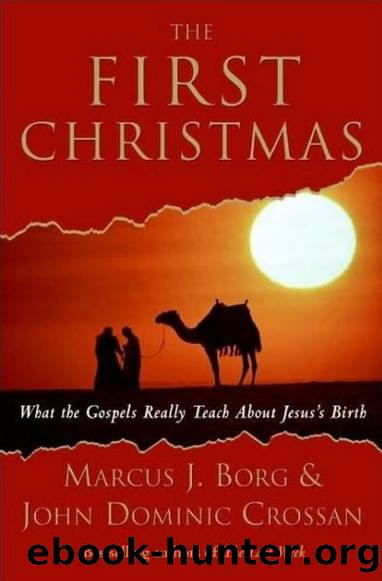The First Christmas: What the Gospels Really Teach About Jesus's Birth by Marcus J. Borg

Author:Marcus J. Borg [Borg, Marcus J.]
Language: eng
Format: epub
ISBN: 9780061743641
Google: uj8WWftikrEC
Amazon: B000WPXTJ2
Barnesnoble: B000WPXTJ2
Goodreads: 1500833
Publisher: HarperOne
Published: 2007-10-08T22:00:00+00:00
CHAPTER SIX
IN DAVIDâS CITY OF BETHLEHEM
We saw in a preceding chapter that the Christmas stories of Matthew and Luke disagree on the location of Jesusâs conception by the Holy Spirit. It was Bethlehem for Matthew, but Nazareth for Luke. They both agree, however, on the location of his birth in Bethlehem and, furthermore, they both agree that Joseph was a descendant of David.
Matthew says that, âJesus was born in Bethlehem of Judeaâ (2:1) and that Joseph is the âson of Davidâ (1:20), and so, therefore, âJesus the Messiah [is] the son of Davidâ (1:1). Luke brings those two elements together: âJoseph also went from the town of Nazareth in Galilee to Judea, to the city of David called Bethlehem, because he was descended from the house and family of David. He went to be registered with Mary, to whom he was engaged and who was expecting a child. While they were there, the time came for her to deliver her childâ (2:4â6).
Matthew and Luke agree, therefore, that Jesus was the new David. But, recall that, as we already saw in Chapter 5 and will see again in this chapter, Jesus is for Matthew the new Moses. Matthewâs Christmas story combines, in other words, Jesus as new Moses and as new David, so that Jesus will âsave his people from their sinsâ (1:21) nonviolently rather than from their enemies violently.
Since Matthew and Luke agree independently on those two points about Jesusâthat he was descended from Davidâs lineage and born in Davidâs cityâthose must come from an earlier tradition than either of their Christmas stories. And, in fact, we find both of those points elsewhere in the New Testament.
First, Paul, in opening his letter to the Romans, speaks of âthe gospel concerning his [Godâs] Son, who was descended from David according to the fleshâ (1:3). Second, John records the crowdâs discussion of Jesusâs messianic status with this interchange: âOthers said, âThis is the Messiah.â But some asked, âSurely the Messiah does not come from Galilee, does he? Has not the scripture said that the Messiah is descended from David and comes from Bethlehem, the village where David lived?ââ (7:41â42). This is a typical instance of Johannine irony. He presumes that Jesus was born at Bethlehem and, therefore, the crowdâs ignorance confirms what they deny. Jesus is the Messiah, and he was born in Bethlehem. Paul and John indicate that common Christian tradition that Jesus was the Davidic Messiah and wasâwhether literally or metaphoricallyâborn in Bethlehem.
While we are on this subject of agreements between Matthew and Luke in their overtures, here is a fuller list of their Christmas story agreements:
Download
This site does not store any files on its server. We only index and link to content provided by other sites. Please contact the content providers to delete copyright contents if any and email us, we'll remove relevant links or contents immediately.
| Exegesis & Hermeneutics | New Testament |
| Old Testament |
The Five People You Meet in Heaven by Mitch Albom(3553)
The Secret Power of Speaking God's Word by Joyce Meyer(3175)
Real Sex by Lauren F. Winner(3013)
Name Book, The: Over 10,000 Names--Their Meanings, Origins, and Spiritual Significance by Astoria Dorothy(2978)
The Holy Spirit by Billy Graham(2943)
0041152001443424520 .pdf by Unknown(2843)
How The Mind Works by Steven Pinker(2811)
ESV Study Bible by Crossway(2773)
Ancient Worlds by Michael Scott(2682)
Churchill by Paul Johnson(2577)
The Meaning of the Library by unknow(2564)
The ESV Study Bible by Crossway Bibles(2548)
The Gnostic Gospels by Pagels Elaine(2527)
MOSES THE EGYPTIAN by Jan Assmann(2411)
Jesus by Paul Johnson(2352)
City of Stairs by Robert Jackson Bennett(2347)
The Complete Dead Sea Scrolls in English (7th Edition) (Penguin Classics) by Geza Vermes(2270)
The Nativity by Geza Vermes(2226)
Ancient Near Eastern Thought and the Old Testament by John H. Walton(2222)
